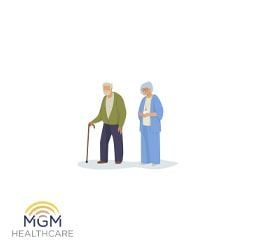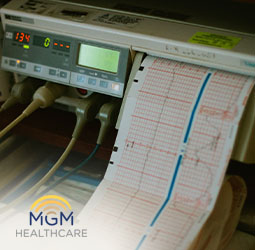MGM Elderly Health Check package is advised for those who are non-diabetic or diabetic and above the age of 60 to be aware of your current health status as a senior citizen.
The test included in this package are:
Blood Grouping and Rh Typing, Complete Haemogram, Glucose Fasting, Glucose Postprandial, Glycated Hemoglobin HbA1c, Lipid Profile, Renal Function Test, Thyroid Stimulating Hormone (TSH), 25-hydroxyvitamin D3, PTH Intact, Uric Acid, Liver Function Test, Calcium, Urine Routine, Stool For Occult Blood (Men), Prostate Specific Antigen (Men), Pap Smear/Cervical Smear (Women), X-ray Chest, Ultrasound Abdomen, Mammogram (Women), Uroflow (Men), DEXA Scan Hip And Spine, ECG, 2D Echo, PHC Consultation (OBGYN/Urology), PHC Consultation (Ophthalmology), PHC Consultation (Physician), PHC Consultation (Rehabilitation), and PHC Consultation (Dietitian).
Blood-typing
To determine your ABO blood group and Rh type
Specimen:A blood sample drawn from a vein in your arm or for infants from a heelstick
When To Get Tested: When you need a transfusion of blood or blood components when you donate blood at a collection facility or donate an organ tissue or bone marrow for transplantation before or during a woman s pregnancy to determine the risk of Rh incompatibility with the fetus
Test Preparation:None
Normal Test Result:
Calcium
To screen for diagnose and monitor a range of conditions
Specimen:A blood sample drawn from a vein in your arm sometimes a random or a timed urine collection such as a 24-hour urine sample
When To Get Tested: As part of a routine metabolic panel when you have symptoms of a disorder or known presence of one affecting your kidneys bones thyroid parathyroid or nerves or when symptoms of significantly increased or decreased calcium concentrations are present when someone is critically ill to monitor ionized calcium levels when someone has certain types cancer when someone is being treated for abnormal calcium levels to evaluate the effectiveness of treatment
Test Preparation:Current practices do not require fasting You may be instructed to stop taking certain medications that can affect the test results such as lithium antacids diuretics and vitamin D supplements among others
Normal Test Result: normal amount of calcium (somewhere between 8.6 mg/dL to 10.3 mg/dL)
Glucose-tests
To determine whether you have an infection of your digestive tract due to disease-causing pathogenic bacteria parasites or viruses
Specimen:A fresh stool sample collected in a clean container the stool sample should not be contaminated with urine or water once it has been collected the stool should either be taken to the laboratory within two hours after collection or transferred into special transport vials containing preservative solutions
When To Get Tested: When you have signs and symptoms such as diarrhea abdominal cramps nausea and or vomiting when you have blood or mucus in your loose stools
Test Preparation:None
Normal Test Result: A blood sugar level less than 140 mg/dL (7.8 mmol/L) is normal
Hemoglobin
To evaluate the hemoglobin content of your blood as part of a general health checkup to screen for and help diagnose conditions that affect red blood cells RBCs if you have anemia low hemoglobin or polycythemia high hemoglobin to assess the severity of these conditions and to monitor response to treatment
Specimen:A blood sample drawn from a vein in your arm or by a fingerstick children and adults or heelstick newborns
When To Get Tested: With a hematocrit or as part of a complete blood count CBC which may be ordered as a component of a general health screen when you have signs and symptoms of anemia weakness fatigue or polycythemia dizziness headache at regular intervals to monitor these conditions or response to treatment
Test Preparation:None
Normal Test Result: Normal results for adults vary, but in general are: Male: 13.8 grams per deciliter (g/dL )to 17.2 grams per deciliter (g/dL) or 138 to 172 grams per liter (g/L) Female: 12.1 to 15.1 g/dL or 121 to 151 g/L
Lipid-panel
To assess your risk of developing cardiovascular disease CVD to monitor treatment
Specimen:A blood sample obtained by inserting a needle into a vein in your arm or from a fingerstick
When To Get Tested: Screening when no risk factors present for adults every four to six years for youths once between the ages of 9 and 11 and again between ages 17 and 21 Monitoring at regular intervals when risk factors are present when prior results showed high risk levels and or to monitor effectiveness of treatment
Test Preparation:Typically fasting for 9-12 hours water only before having your blood drawn is required but some labs offer non-fasting lipid testing Follow any instructions you are given and tell the person drawing your blood whether or not you have fasted For youths without risk factors testing may be done without fasting
Normal Test Result: the ratio should be below 4
Pap-test
To screen for cervical cancer and certain vaginal or uterine infections
Specimen:Cells from the cervical area
When To Get Tested: For women age 21 or older once every 3 to 5 years depending on your age risk factors use of other screening tests and your healthcare provider s advice
Test Preparation:You may be instructed not to douche or tub bathe for 24 hours before the Pap test is to be performed You may also be asked to refrain from sexual intercourse for 24 to 48 hours before the test Do not use any vaginal creams or foams for 48 hours prior to the exam and do not schedule the test during your menstrual period
Normal Test Result: A normal (or “negative”) result means that no cell changes were found on your cervix. This is good news. But you still need to get Pap tests in the future
Parathyroid-hormone-pth
To determine the cause of calcium imbalances to evaluate parathyroid function to diagnose and differentiate between primary secondary and tertiary hyperparathyroidism to diagnose hypoparathyroidism during surgery for hyperparathyroidism to confirm removal of the gland s causing the problem
Specimen:A blood sample drawn from a vein in your arm
When To Get Tested: When calcium blood levels are higher or lower than normal when you are having surgery for hyperparathyroidism when your health practitioner wants to determine how well your parathyroid glands are functioning
Test Preparation:Current practices do not require fasting PTH levels peak during sleep hours and are lowest during mid-morning to late afternoon hours the period when most samples are drawn There may be seasonal fluctuations in PTH due to its inverse relationship with vitamin D Talk to your health practitioner about sample timing
Normal Test Result: 14 pg/mL to 65 pg/mL
Prostate-specific-antigen-psa
To screen men for prostate cancer to help determine the necessity for a biopsy of the prostate to monitor the effectiveness of treatment for prostate cancer and or to detect recurrence of prostate cancer
Specimen:A blood sample drawn from a vein in your arm
When To Get Tested: When a man has symptoms suggestive of prostate cancer such as difficult painful and or frequent urination may also be ordered during and at regular intervals after prostate cancer treatment in asymptomatic men after a discussion with your healthcare provider about the benefits and harms of screening and you make an informed decision to undergo screening For specific details see prostate cancer screening for Adults and Adults 50 and Up
Test Preparation:Avoid ejaculation for 24 hours before sample collection as it has been associated with elevated PSA levels the sample should also be collected prior to your health practitioner performing a digital rectal exam DRE and prior to or several weeks after a prostate biopsy
Normal Test Result: normal PSA level is considered to be 4.0 nanograms per milliliter (ng/mL) of blood, but this varies by age
Renal-panel
To help diagnose and manage conditions affecting kidney function may be used as part of general health screening or to screen someone who is at risk of developing kidney disease or to follow someone with known kidney disease
Specimen:A blood sample drawn from a vein in your arm
When To Get Tested: When you have signs and symptoms that suggest that you may have a condition affecting the function of your kidneys when you are being treated for kidney disease when you have certain risk factors for kidney disease such as high blood pressure or diabetes
Test Preparation:You may be instructed to fast for 8-12 hours no food only water prior to the test
Normal Test Result: 0.6 mg/dL –1.1 mg/dL in women and 0.7–1.3 mg/dL in men
Stool-culture
To determine whether you have an infection of your digestive tract due to the presence of disease-causing pathogenic bacteria
Specimen:A fresh stool sample transported to the laboratory within 2 hours or one that has been placed in a transport medium a collection vial containing a preservative
When To Get Tested: When you have diarrhea abdominal cramps nausea and or vomiting that is severe or lasts more than a few days
Test Preparation:None
Normal Test Result:
Thyroid-stimulating-hormone-tsh
To screen for and help diagnose thyroid disorders to monitor treatment of hypothyroidism and hyperthyroidism
Specimen:A blood sample drawn from a vein in your arm or from pricking the heel of an infant
When To Get Tested: For screening Newborn screening is widely recommended however there is no consensus within the medical community as to the age adult screening should begin or whether screening should be done For monitoring treatment as directed by your healthcare provider Otherwise when a person has symptoms of hyperthyroidism or hypothyroidism and or an enlarged thyroid
Test Preparation:None needed however certain medications can interfere with the TSH test so tell your health practitioner about any drugs that you are taking If you take thyroid hormone as treatment for thyroid disease it is recommended that your blood sample be drawn before you take your dose for that day
Normal Test Result: from 0.4 mIU/L to 4.0 mIU/L for those with no symptoms of an under- or over-active thyroid
Uric-acid
To detect high levels of uric acid in the blood which could be a sign of the condition gout or to monitor uric acid levels when undergoing chemotherapy or radiation treatment to detect high levels of uric acid in the urine in order to diagnose the cause of kidney stones and to monitor those with gout who are at risk of developing such stones
Specimen:A blood sample drawn from a vein in the arm or a 24-hour urine sample
When To Get Tested: When you have joint pain or other symptoms that your healthcare practitioner suspects may be due to gout when you have had or are going to have certain chemotherapy or radiation therapies for cancer when you have recurrent kidney stones when you have gout or are otherwise at risk for kidney stone formation
Test Preparation:None may be needed however some institutions recommend fasting Follow any instructions you are given
Normal Test Result: 2.4 mg/dL -6.0 mg/dL (female) and 3.4 mg/dL -7.0 mg/dL (male)
Fasting Blood Sugar
This is the test that measures blood sugar levels. Elevated levels are associated with diabetes and insulin resistance, in which the body cannot properly handle sugar.
Complete Blood Count
To determine your general health status; to screen for, diagnose, or monitor any one of a variety of diseases and conditions that affect blood cells. A blood sample is drawn from a vein in your arm or a fingerstick
HbA1c
Liver Function Test
Liver function tests, also known as liver chemistries, help determine the health of your liver by measuring the levels of proteins, liver enzymes, and bilirubin in your blood
Urine Routine
USG Abdomen
Abdominal ultrasound is a type of imaging test. It is used to look at organs in the abdomen, including the liver, gallbladder, spleen, pancreas, and kidneys.
25-OH VITAMIN D
The 25-hydroxy vitamin D test is the most accurate way to measure how much vitamin D is in your body.










